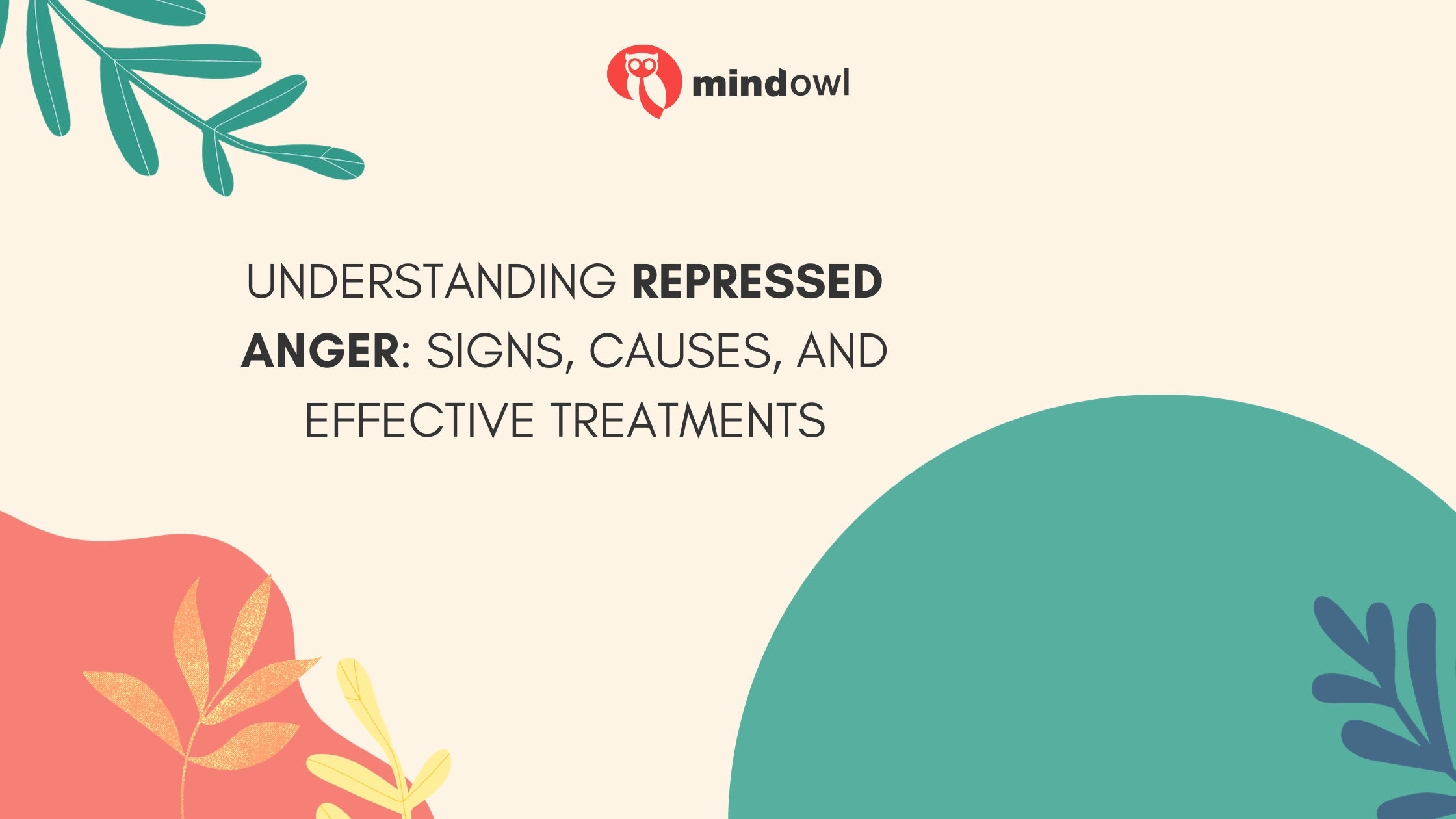
Are you often irritated without understanding why? This could be a sign of repressed anger, an emotion we bury deep within when it’s too painful or difficult to express. In this article, we’ll decode the signs and causes of this hidden turmoil and guide you through effective treatment options.
Ready for some emotional enlightenment? Let’s plunge in!
Key Takeaways
- Repressed anger is when a person consciously or unconsciously suppresses their feelings of anger, often due to childhood experiences, societal norms, or fear of confrontation.
- Signs of repressed anger include difficulty expressing emotions, frequent irritability or mood swings, passive-aggressive behavior, and physical symptoms like headaches and muscle tension.
- Repressed anger can have negative effects on mental and emotional well – being, damaging relationships and leading to physical health consequences.
- Effective strategies for coping with repressed anger include understanding your triggers, tracking physical sensations, journaling, seeking therapy or counseling, practicing relaxation techniques like deep breathing and meditation, engaging in regular exercise to release pent-up energy,
Defining Repressed Anger
 Repressed anger is when a person consciously or unconsciously suppresses and holds back their feelings of anger instead of expressing them openly.
Repressed anger is when a person consciously or unconsciously suppresses and holds back their feelings of anger instead of expressing them openly.
Explanation of repressed anger
Repressed anger hides deep in your mind. It is a type of anger you don’t show or talk about. This differs from loud, outward anger which people can see and hear. Sometimes, you may not know the anger is there until it causes trouble for you.
Fears or old rules about not showing feelings can force this anger down into hiding. Often, repressed anger will leak out as small bursts of moodiness or fuss. The person with hidden anger might even feel blue often or act mean without knowing why.
It’s important to know that this kind of quiet, hidden rage needs care just like loud rage does.
How it differs from expressed anger
Repressed anger is not like expressed anger. It is hidden and kept inside on purpose. With repressed anger, a person keeps their mad feelings to themselves. They don’t let others know they are upset.
This can lead to bad moods, feeling sad all the time or even scary thoughts.
Expressed anger is different. Here, people show that they are mad in clear ways. They may tell you they are annoyed or upset about something. Their face might look angry too. So, these two types of anger can be very different! One stays hidden and the other one does not.
Causes & Triggers of Repressed Anger

– Childhood experiences can be one of the causes and triggers of repressed anger.
Childhood experiences
Childhood times can shape our feelings in big ways. Kids who see anger a lot may learn to hide theirs. This is often true when parents yell, fight, or act mean. Then the kids think, “I don’t want to be like that”.
Some kids face bad things growing up. This could be hurtful words, neglect or even abuse. These pains get stuck inside them and grow into anger later on. They might not know why they’re angry because it’s linked to old memories they’ve tried to forget.
Cultural/societal norms
Society sets rules on how we should act. This includes our anger too. Some cultures think it’s bad to show anger. Others may see anger as something normal. For girls, it is often frowned upon to show anger.
This can lead them to repress their feelings of resentment and rage. Anger can also be stronger in those with low social standing, especially in the West. In some places like Korea, repressed anger might even turn into a sickness called Hwabyung.
People who have this illness feel like they are on fire from inside out both mentally and physically.
Fear of confrontation or expression
Many people hold back their anger. They fear fights or hard talks. This is the fear of confrontation. It can make you repress anger. You may think it’s better to stay quiet than fight or upset anyone.
Fear of expression is also common in people with repressed anger. You might worry that showing your anger will hurt others’ feelings, so you hide it deep down. Both these fears can lead to problems like stress and tension over time.
Signs of Repressed Anger
– Difficulty expressing emotions: Individuals with repressed anger often struggle to express their feelings in a healthy and constructive manner.
– Frequent irritability or mood swings: Repressed anger can manifest as heightened irritability or sudden shifts in mood without an obvious cause.
– Passive-aggressive behavior: People with repressed anger may resort to passive-aggressive tactics, such as sarcasm, manipulation, or subtle acts of defiance.
– Physical symptoms: Headaches, muscle tension, digestive problems, and other physical ailments can be signs of unresolved anger that has been suppressed.
Difficulty expressing emotions
Having a hard time showing feelings may mean you have repressed anger. Sometimes, people see anger as something bad. They might not let themselves feel it or show it to others. This can start when they are kids and keep going into adult life.
Fear of anger continues because they think expressing their anger may hurt someone else’s feelings or cause fights. So, they keep quiet instead of letting the natural emotion out in a healthy way.
But ignoring your own feelings can lead to other problems later on like mood swings and health issues.
Frequent irritability or mood swings
People with repressed anger often show signs of being easily upset. They may have quick mood swings without a clear reason. One moment they seem happy and the next they might be angry or sad.
This can occur because deep down, they hold onto anger instead of expressing it healthily. This constant switch in feelings is more than just having a bad day; it’s a sign that something else may be going on beneath the surface.
Passive-aggressive behavior
Passive-aggressive behavior is a common sign of repressed anger. When someone displays passive-aggressive behavior, they may seem agreeable on the surface but actually feel angry or resentful underneath.
Instead of expressing their anger directly, they show it indirectly through subtle and often manipulative actions. This can include things like making sarcastic remarks, giving backhanded compliments, or intentionally procrastinating tasks.
Passive aggression is closely linked to guilt because people who exhibit this behavior often believe that they are wrong for feeling angry in the first place. It’s important to recognize passive-aggressive behavior as a possible indication of repressed anger and address it in a healthy way.
People with repressed anger may also engage in secretive, hostile, and sulky behaviors. They might withdraw from conversations or deliberately ignore others as a way to express their discontentment without directly confronting the issue at hand.
Physical symptoms
Repressed anger can manifest in various physical symptoms. These may include tightness in the chest, churning in the stomach, weakness in the legs, a rapid heartbeat, and tense muscles.
It’s important to pay attention to these signals from your body as they could be indications of underlying anger that needs to be addressed. Uncontrolled anger can even have long-term physical effects such as increased anxiety, high blood pressure, and headaches.
Taking note of these physical manifestations can help you identify and deal with repressed anger more effectively.
Negative Effects of Repressed Anger
Repressed anger can have a detrimental impact on your mental and emotional well-being, damaging relationships and leading to physical health consequences.
Impact on mental and emotional well-being
Repressing anger can have a negative impact on our mental and emotional well-being. When we hold in our anger instead of expressing it in a healthy way, it can lead to increased anxiety and stress.
In the long term, uncontrolled anger may also contribute to higher blood pressure and more frequent headaches. It’s important to understand that anger is a normal emotion, and suppressing it can be harmful to our physical and mental health.
Expressing our anger in assertive ways can actually help us release tension and promote overall well-being. So, it’s crucial that we find healthy ways to deal with our repressed anger rather than letting it build up inside us.
Damaging relationships
Repressed anger can have a damaging effect on relationships. When anger is repressed, it doesn’t go away. Instead, it builds up inside and can lead to passive-aggressive behavior. This silent form of anger can slowly erode trust and intimacy in relationships over time.
Those on the receiving end may feel confused, frustrated, and even resentful without understanding the underlying cause. Repressed anger not only damages emotional connections but also creates an atmosphere of tension and unease.
It’s important to address repressed anger in order to prevent further harm to relationships and maintain healthy interactions with others.
Moreover, repressed anger can also negatively impact physical health due to increased stress levels and internalized emotions. The constant suppression of anger takes a toll on mental well-being as well, often leading to feelings of frustration or irritability that can further strain relationships.
Physical health consequences
Repressed anger can have serious physical health consequences. Uncontrolled anger can lead to increased anxiety, high blood pressure, and headaches. It can also cause psychosomatic ailments like indigestion, chronic pain, and chronic fatigue.
In fact, repressed anger is associated with heart disease. Different patterns of anger expression may have varying health consequences which can differ by gender. So it’s important to address and deal with repressed anger in order to maintain good physical health.
Coping with Repressed Anger: 8 Strategies
In this section, we will discuss 8 effective strategies for dealing with repressed anger.
Understanding your anger triggers
To effectively deal with repressed anger, it’s important to understand what triggers your anger. Triggers are situations or events that cause us to feel angry. They can be different for each person, so it’s essential to identify and recognize your individual triggers.
This might involve reflecting on past experiences and paying attention to patterns in your emotional responses. By understanding the specific things that make you angry, you can develop strategies to manage and cope with your anger more effectively.
Tracking physical sensations
Repressed anger can be difficult to recognize and understand, but tracking physical sensations can help shed light on this hidden emotion. When anger is repressed, it often manifests in the body through various physical symptoms.
These may include tightness or tension in the chest, increased heart rate, headaches, stomachaches, or even muscle tension. By paying attention to these bodily cues, individuals can begin to identify when they are experiencing repressed anger.
This self-monitoring allows for a greater awareness of their emotional state and provides an opportunity to address and cope with the underlying causes of their anger. Tracking physical sensations is an important step towards recognizing and managing repressed anger effectively.
Journaling
Journaling is a helpful tool for coping with repressed anger. It allows individuals to reflect on their thoughts and emotions, fostering self-awareness and mindfulness. By writing down their experiences, people can uncover underlying causes of their anger, such as childhood trauma.
Journaling also provides a healthy outlet for expressing and releasing pent-up anger. In fact, expressive writing has been shown to reduce symptoms of depression. Through journaling, individuals can process unresolved emotions and gain a better understanding of themselves in order to effectively deal with their repressed anger.
Interrupting angry thoughts
One helpful strategy for coping with repressed anger is to interrupt angry thoughts. When we’re feeling angry, our thoughts often become negative and repetitive, which can intensify our anger.
By consciously interrupting these thoughts, we can disrupt the cycle of anger and start shifting our mindset. One way to do this is by engaging in a distracting activity or changing our environment when we notice ourselves getting caught up in angry thoughts.
For example, taking a walk outside or listening to calming music can help redirect our focus away from anger. Another approach is to challenge negative thought patterns by questioning their validity and considering alternative perspectives.
Finding physical outlets
Engaging in physical activities and finding creative ways to express anger can be beneficial for those struggling with repressed anger. Physical outlets like exercise, sports, or even dancing can help release pent-up tension and provide a healthy way to channel emotions.
Additionally, expressing anger through artistic means such as painting, writing, or playing music allows individuals to explore their feelings without harming themselves or others.
These physical outlets not only offer a productive outlet for the built-up energy but also contribute to overall well-being by reducing stress and promoting better emotional balance.
Mindfulness and meditation
Mindfulness and meditation are effective strategies for coping with repressed anger. When practiced regularly, these techniques can reduce stress, promote relaxation, and improve mood.
Additionally, mindfulness and meditation help individuals quiet racing thoughts associated with repressed anger.
Research has shown that mindfulness meditation is particularly beneficial in managing anger. By engaging in these practices, individuals can learn to cope with and accept negative emotions without reacting impulsively.
Using “I-statements”
To effectively cope with repressed anger, using “I-statements” can be a valuable tool. Instead of blaming or accusing others, “I-statements” allow individuals to express their feelings and needs assertively.
For example, saying “I feel frustrated when you interrupt me during conversations” communicates your emotions without attacking the other person. This technique promotes healthy communication and helps avoid escalating conflicts.
By taking accountability for our own emotions and using “I-statements,” we can better manage low frustration tolerance and improve relationships. So, next time you find yourself feeling angry, try using “I-statements” to express your feelings in a constructive way.
Allowing yourself to feel emotions
It is important to give yourself permission to feel your emotions, including anger. Anger is a normal and natural emotion that everyone experiences from time to time. When we suppress or repress our anger, it can lead to negative consequences for our mental and emotional well-being.
By allowing ourselves to acknowledge and understand our anger, we can better identify the root causes of it and find healthier ways to express and cope with it. This can help prevent the build-up of repressed anger and contribute to improved overall emotional health.
Remember, it’s okay to feel angry – what matters is how we choose to deal with it in a healthy way.
Effective Treatments for Repressed Anger
Therapy options like cognitive behavioral therapy and anger management, along with lifestyle changes such as exercise and relaxation techniques, can be effective treatments for repressed anger.
Therapy options (cognitive behavioral therapy, anger management)
There are effective treatments available to help individuals with repressed anger. Two commonly used therapy options are cognitive behavioral therapy (CBT) and anger management.
- Cognitive behavioral therapy (CBT) is a treatment that helps individuals understand their anger triggers and teaches them healthy coping skills.
- Anger management is another therapy option that focuses on teaching individuals how to recognize their triggers and express their anger in a constructive way.
- CBT is considered an effective, time – limited treatment for anger problems.
- Research has shown that CBT can help individuals replace unhealthy anger responses with more positive and adaptive behaviors.
- Both CBT and anger management provide practical strategies for managing and expressing anger in a healthy way.
Lifestyle changes (exercise, relaxation techniques)
Making lifestyle changes can be an effective way to manage repressed anger. Here are some strategies you can try:
- Regular exercise: Engaging in physical activity, such as walking, jogging, or dancing, can help release pent-up emotions and reduce stress.
- Relaxation techniques: Practice deep breathing exercises, progressive muscle relaxation, or meditation to calm your mind and body. These techniques can help you relax and let go of anger.
- Self-care: Take care of yourself by getting enough sleep, eating well-balanced meals, and maintaining a healthy lifestyle. When you prioritize self-care, you’ll be better equipped to handle anger triggers.
- Time management: Organize your day and set realistic goals to avoid feeling overwhelmed or stressed. Feeling in control of your time can reduce irritability and frustration.
- Healthy coping mechanisms: Find healthy ways to cope with anger, such as listening to music, writing in a journal, or engaging in hobbies that bring you joy. These activities can distract you from negative thoughts and channel your energy in a positive way.
Knowing when to seek professional help
Identifying that you struggle with repressed anger is the first step in seeking professional help for effective treatment. Seeking support from a counselor or therapist who specializes in anger management can be beneficial in learning healthy ways to express your anger and manage it appropriately.
It is important to carefully choose a qualified professional and ensure that their approach aligns with your needs and goals. By understanding the causes and signs of repressed anger, you can recognize when it’s necessary to seek professional assistance for guidance and support in dealing with this issue effectively.
Conclusion
In conclusion, understanding repressed anger is crucial for our mental and emotional well-being. By recognizing the signs and causes of repressed anger, we can take proactive steps to manage it effectively.
Seeking therapy, making lifestyle changes, and learning healthy coping mechanisms are all effective treatments that can help us release and express our anger in a positive way. Let’s strive to understand and address our repressed anger to lead happier and healthier lives.
FAQs
What is repressed anger?
A: Repressed anger refers to the emotions and feelings of anger that are consciously or unconsciously suppressed or held back by an individual.
What are the common symptoms of repressed anger?
A: The symptoms of repressed anger can manifest in various ways, such as frequent headaches, muscle tension, irritability, passive-aggressive behavior, difficulty expressing emotions, and feelings of resentment or bitterness.
What are the causes of repressed anger?
A: Repressed anger can have various causes, including childhood experiences of being discouraged or punished for expressing anger, societal expectations to suppress emotions, fear of confrontation or conflict, traumatic events, and a belief that anger is unacceptable or dangerous.
How can one release repressed anger?
A: There are several effective ways to release repressed anger. These include practicing stress management techniques like deep breathing and meditation, engaging in physical activities like exercise or sports, talking to a trusted friend or therapist, expressing emotions through journaling or art, and learning healthy communication and assertiveness skills.
Is it true that repressed anger is harmful?
A: Yes, repressed anger can have detrimental effects on both physical and mental health. It can lead to increased stress levels, weakened immune system, high blood pressure, relationship difficulties, depression, anxiety, and even explosive outbursts of anger.
Why do some people repress their anger?
A: People may repress their anger for various reasons. It could be due to cultural or social conditioning that discourages the expression of anger, fear of the consequences or judgment associated with anger, a desire to maintain harmony or avoid conflict, or a belief that expressing anger is ineffective or unproductive.
Can anger be helpful or beneficial?
A: Yes, anger is a natural emotion and can be helpful in certain situations. It can serve as a signal that something is wrong or unjust, motivate change or action, and assert personal boundaries. However, it is important to express and manage anger in healthy and constructive ways.
How can one identify repressed anger in themselves?
A: Identifying repressed anger in oneself can be challenging since it is often hidden or unconscious. However, common signs include sudden outbursts of anger, passive-aggressive behavior, exaggerated emotional reactions, physical symptoms, and an inability to express or confront anger directly.
What is the impact of repressed anger on relationships?
A: Repressed anger can have a significant impact on relationships. It can lead to a breakdown in communication, increased conflict, feelings of resentment or bitterness, difficulty in trust-building, and may ultimately damage or strain relationships over time.
How can one effectively deal with repressed anger?
A: Dealing with repressed anger requires a combination of self-awareness and healthy coping strategies. This can involve acknowledging and accepting one’s anger, seeking professional help or therapy, learning and practicing anger management techniques, and developing assertiveness skills to express anger in a constructive manner.
MindOwl Founder – My own struggles in life have led me to this path of understanding the human condition. I graduated with a bachelor’s degree in philosophy before completing a master’s degree in psychology at Regent’s University London. I then completed a postgraduate diploma in philosophical counselling before being trained in ACT (Acceptance and commitment therapy).
I’ve spent the last eight years studying the encounter of meditative practices with modern psychology.

